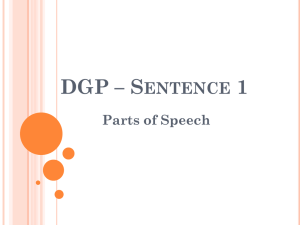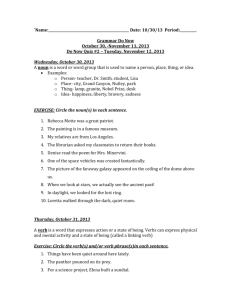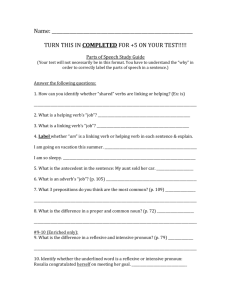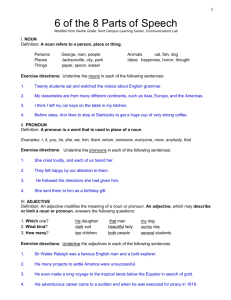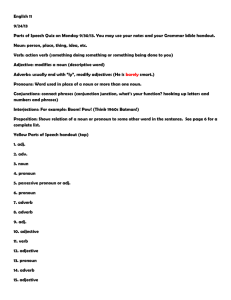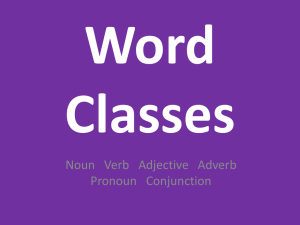File
advertisement
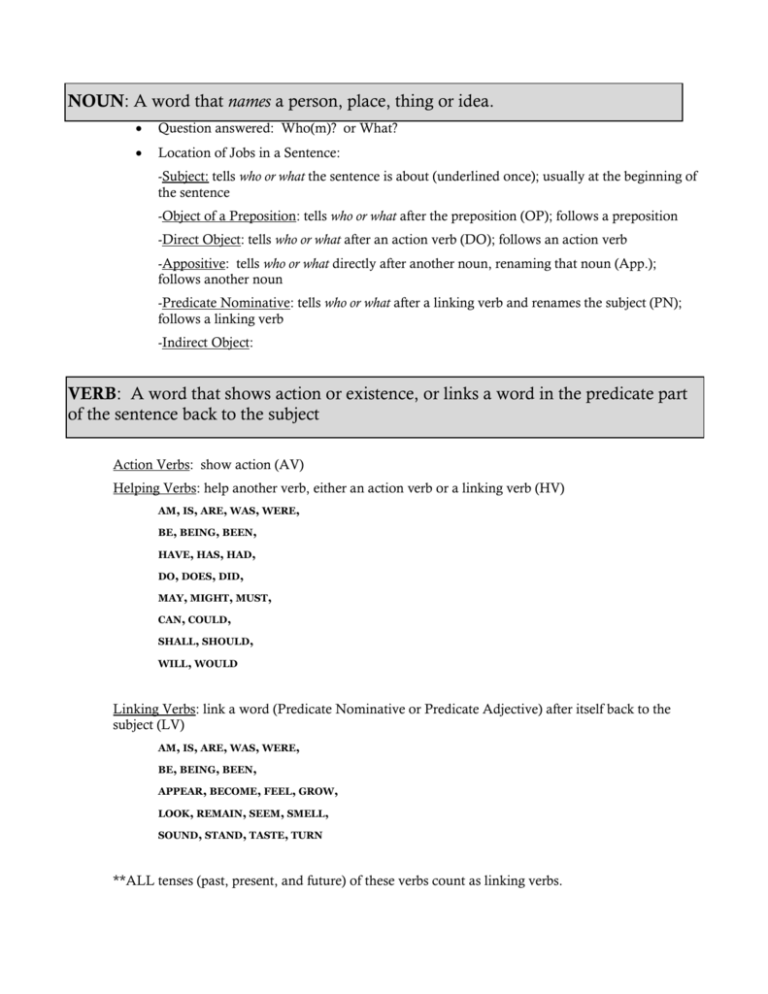
NOUN: A word that names a person, place, thing or idea. Question answered: Who(m)? or What? Location of Jobs in a Sentence: -Subject: tells who or what the sentence is about (underlined once); usually at the beginning of the sentence -Object of a Preposition: tells who or what after the preposition (OP); follows a preposition -Direct Object: tells who or what after an action verb (DO); follows an action verb -Appositive: tells who or what directly after another noun, renaming that noun (App.); follows another noun -Predicate Nominative: tells who or what after a linking verb and renames the subject (PN); follows a linking verb -Indirect Object: VERB: A word that shows action or existence, or links a word in the predicate part of the sentence back to the subject Action Verbs: show action (AV) Helping Verbs: help another verb, either an action verb or a linking verb (HV) AM, IS, ARE, WAS, WERE, BE, BEING, BEEN, HAVE, HAS, HAD, DO, DOES, DID, MAY, MIGHT, MUST, CAN, COULD, SHALL, SHOULD, WILL, WOULD Linking Verbs: link a word (Predicate Nominative or Predicate Adjective) after itself back to the subject (LV) AM, IS, ARE, WAS, WERE, BE, BEING, BEEN, APPEAR, BECOME, FEEL, GROW, LOOK, REMAIN, SEEM, SMELL, SOUND, STAND, TASTE, TURN **ALL tenses (past, present, and future) of these verbs count as linking verbs. PREPOSITION: A word that shows a relationship between its object and the rest of the sentence [A preposition MUST have an object (OP)—a noun or pronoun that tells who or what after it—in order to actually be a preposition.] ABOARD BECAUSE OF CONCERNING IN OF SINCE UNDER ABOUT BEFORE DOWN INSIDE OFF THROUGH UNDERNEATH ABOVE BEHIND DURING INSTEAD OF ON TO UNTIL ACROSS BELOW EXCEPT INTO ONTO TOWARD UP AFTER BENEATH FOR LIKE OUT TOWARDS WITH AGAINST BESIDE FROM NEAR OUTSIDE WITHIN ALONG BESIDES OVER WITHOUT AMONG BETWEEN PAST AROUND BEYOND AS BY AT **Prepositional Phrase: A group of words that begins with a preposition, ends with its object of the preposition, and includes adjectives, and possibly adverbs, in between. A prepositional phrase will not have a verb in it. (Preposition modifiers OP) *Prepositional Phrases act like adjectives and adverbs. (see below) ADJECTIVE: A word that describes or modifies a noun or pronoun Questions Answered: Which one? What kind? How many? Location of Jobs in a Sentence Adjective: a word that tells which one, what kind, or how many about the subject, object of the preposition, direct object, appositive, predicate nominative, or indirect object (adj.); most of the time, an adjective will directly precede the noun or pronoun it describes or modifies Predicate Adjective: an adjective following a linking verb that describes of modifies the subject (PA); follows a linking verb ADVERB: A word that describes or modifies a verb, adjective, or another adverb; many adverbs end in -ly (adv.) Questions Answered: When? Where? To what extent? Why? How? Under what condition? Location: Adverbs can begin or end sentences, or they may be just before or after the word they are modifying or describing. Test: If the word you believe to be an adverb is at the beginning of a sentence, move it to the end. If the meaning of the sentence stays the same, you have an adverb. (The same also works for moving it from the end to the beginning.) CONJUNCTION: A word that connects words, phrases, and clauses Coordinate Conjunctions: words that connect words, phrases, or clauses of the same type, grammatically AND, BUT, OR, FOR, SO, NOR, YET Correlative Conjunctions: conjunctions that “travel” in pairs, connecting words, phrases, and clauses of the same type, grammatically EITHER…OR NEITHER…NOR NOT ONLY…BUT ALSO BOTH…AND Subordinate Conjunctions: words that begin dependent clauses, mostly adverb clauses AFTER BECAUSE IN ORDER THAT THAN WHEN ALTHOUGH BEFORE NOW THAT THAT WHENEVER AS EVEN IF ONCE THOUGH WHERE AS IF EVEN THOUGH RATHER THAN* TILL WHEREAS* AS LONG AS IF SINCE UNLESS WHEREVER AS THOUGH* IF ONLY SO THAT UNTIL WHILE *Words marked out are subordinate conjunctions, but the students tend to NOT use them as such. PRONOUN: A word that takes to place of or refers back to a noun (An antecedent is the noun that the pronoun refers to or replaces) Personal Pronoun: a pronoun which is characterized by number, case, and person 1st Person Nominative Case Objective Case Possessive Case I ME MY, MINE WE US OUR, OURS Singular YOU YOU YOUR, YOURS Plural YOU YOU YOUR, YOURS HE, SHE, IT HIM, HER, IT HIS, HER, HERS, ITS THEY THEM THEIR, THEIRS Singular Plural 2nd Person Singular 3rd Person Plural Relative Pronoun: a pronoun that begins an adjective clause WHO, WHOSE, WHOM, WHICH, THAT, WHOEVER, WHOMEVER, WHATEVER, WHICHEVER Interrogative Pronoun: a pronoun that asks a question WHO, WHOSE, WHOM, WHICH, WHAT Demonstrative Pronoun: a pronoun that points out or identifies a noun without naming that noun THIS, THAT, THESE, THOSE Indefinite Pronoun: a pronoun that does not specifically name its antecedent ALL BOTH EVERYTHING NOBODY SEVERAL ANOTHER EACH FEW NONE SOME ANY EACH ONE MANY NO ONE SOMEBODY ANYBODY EITHER MOST NOTHING SOMEONE ANYONE EVERYBODY MUCH ONE SOMETHING ANYTHING EVERYONE NEITHER OTHER SUCH INTERJECTION: A word that shows excitement or emotion AHA GEE HA HOORAY OOPS WELL ALAS GREAT HEY OH OUCH WOW OTHER PARTS OF SENTENCES PHRASE: a group of related words CLAUSE: a group of related words containing a subject and verb Independent Clause: a clause that contains a complete thought; can stand alone as a sentence **Also called a main clause or sentence Dependent Clause: a clause that does NOT contain a complete thought; can NOT stand alone as a complete sentence **Also called subordinate clause Dependent Clauses are used as adjectives, adverbs, and nouns Adjective Clause—a dependent clause that begins with a relative pronoun and modifies a noun or pronoun Adverb Clause—a dependent clause that begins with a subordinate conjunction and modifies a verb, adjective, or another adverb Noun Clause—a dependent clause that begins with a relative pronoun and acts like a noun (subject, direct object, object of a preposition, indirect object, or predicate nominative) in an independent clause. VERBAL: a verb form that is not used as a verb type of verbal formed by. . . used as. . . PARTICIPLE verb + ed or +ing adjective INFINITIVE “to” + verb noun, adjective, adverb GERUND verb + ing noun **VERBAL PHRASES include the verbal (verb form) and its modifiers (adjectives, adverbs, prepositional phrases) or completers (direct objects or predicate nominatives)



